#labor
Text
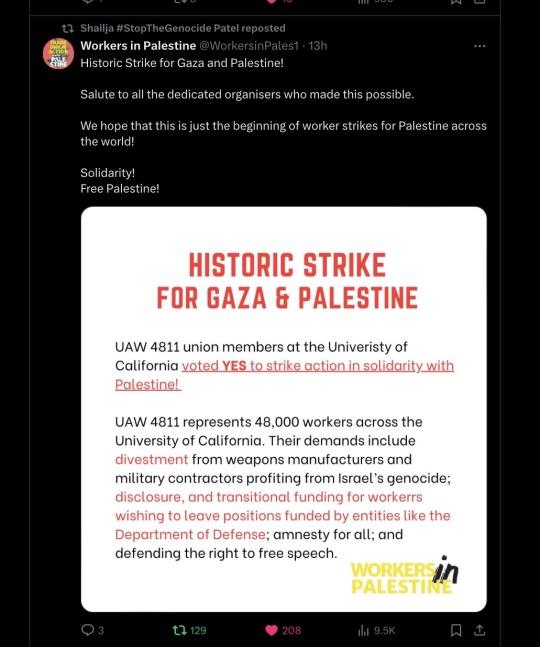
[Image ID: Screenshot of a tweet by Workers in Palestine @WorkersinPales1
Text:
Historic Strike for Gaza and Palestine!
Salute to all the dedicated organisers who made this possible.
We hope that this is just the beginning of worker strikes for Palestine across the world!
Solidarity! Free Palestine!
Historic Strike for Gaza & Palestine.
UAW 4811 union members at the Univeristy of California voted YES to strike action in solidarity with Palestine!
UAW 4811 represents 48,000 workers across the University of California. Their demands include divestment from weapons manufacturers and military contractors profiting from Israel's genocide; disclosure, and transitional funding for workers wishing to leave positions funded by entities like the Department of Defense; amnesty for all; and defending the right to free speech.
End ID]
43 notes
·
View notes
Text
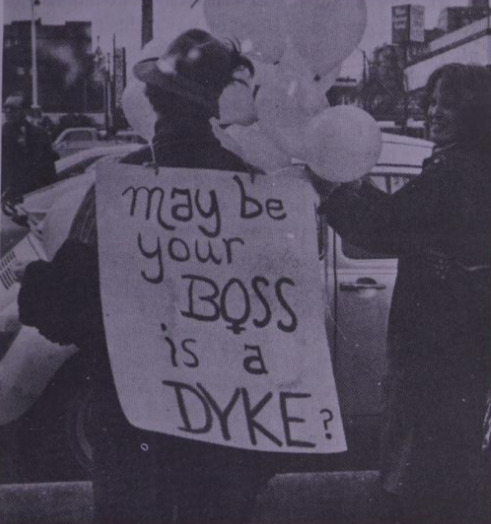
from the cover of Womonspace 1986
23 notes
·
View notes
Text
Dave Jamieson at HuffPost:
Mercedes-Benz workers in Alabama have voted against joining the United Auto Workers, a setback for the union as it tries to organize the auto industry in the South.
The vote count at the German manufacturer’s facilities in Vance, near Tuscaloosa, was 2,045 to 2,642 against the union, according to a preliminary tally from the National Labor Relations Board. More than 5,000 workers were eligible to cast ballots in the weeklong election that ended Friday.
The union has a week to challenge the results.
The UAW was coming off a historic victory at Volkswagen’s Tennessee plant last month, where workers had voted overwhelmingly in favor of unionization. But the loss at Mercedes could slow the union’s plans to organize more foreign-owned auto facilities in Southern states.
UAW President Shawn Fain said in a press conference following the results that the union and its supporters had “left everything on the table.”
“While this loss stings, I’ll tell you this: We’re gonna keep our heads up,” Fain said. “We fought the good fight and we’re going to continue forward. Ultimately, these workers here are going to win.”
Mercedes thanked employees for voting in a statement following the election.
“Our goal throughout this process was to ensure every eligible Team Member had the opportunity to participate in a fair election,” the company said.
[...]
The UAW has long represented auto workers at the “Big Three” of Ford, General Motors and Jeep parent company Stellantis, primarily in the Midwest. But over the years, foreign manufacturers like Mercedes, Volkswagen, Nissan and Hyundai have established factories in the South to take advantage of lower wages and “right to work” laws, reducing the UAW’s density across the industry.
Organizing those plants is key to the UAW restoring its once-formidable bargaining power, and to boosting wages and benefits in Southern facilities that lag behind unionized plants.
Sad news in Alabama: The UAW lost the vote to unionize the Vance, AL Mercedes-Benz plant 2,642 to 2,045.
#Unions#Labor#Unionization#UAW#United Auto Workers#Mercedes Benz#Mercedes Benz Vance#Vance Alabama#Alabama
18 notes
·
View notes
Text
Job interview tip I got from a tiktok but it's genius:
If you were unemployed for a while, they're going to ask if you can explain the gap in your resume. Unless you were actually doing something cool & relevant, this is hard to answer in a way that makes you sound like a good corporate cog. So here's the best and infallible answer -
No you cannot, because you signed an NDA.
You now sound mysterious, desirable, worldly, experienced. They can't even really ask you more about it! Perfect.
#obviously it is morally correct to lie on job applications/at interviews#level that playing field any way you can#employment#labor#job interview tips
45K notes
·
View notes
Text
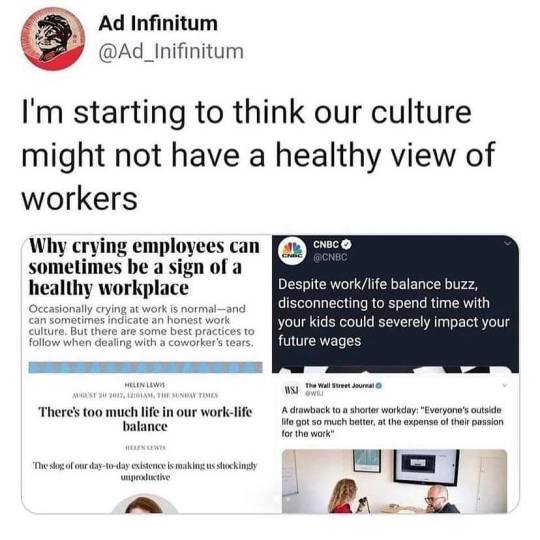
36K notes
·
View notes
Text
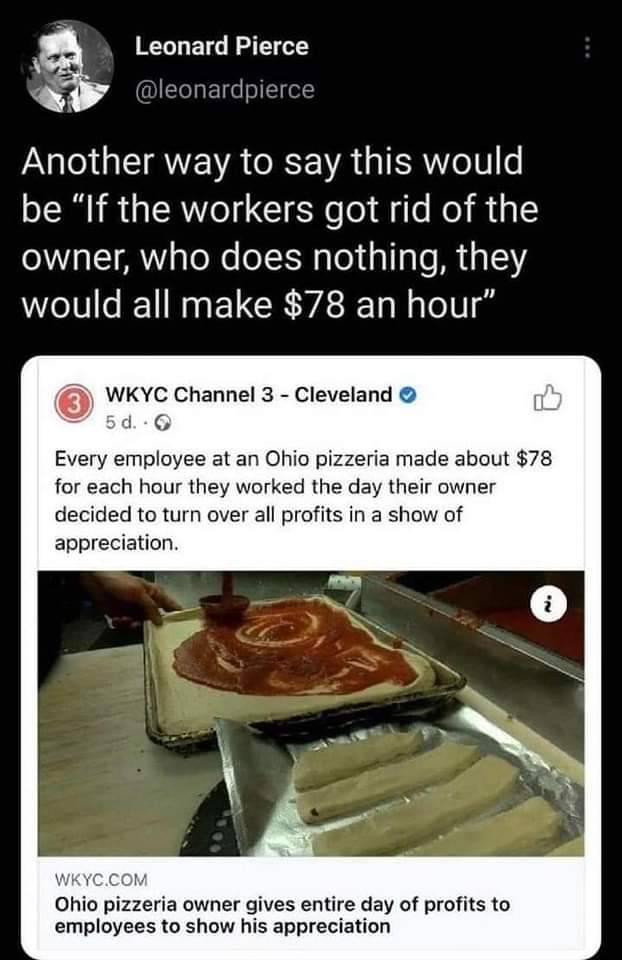
Stuff like this radicalizes me. How is this the best system we have?
73K notes
·
View notes
Text


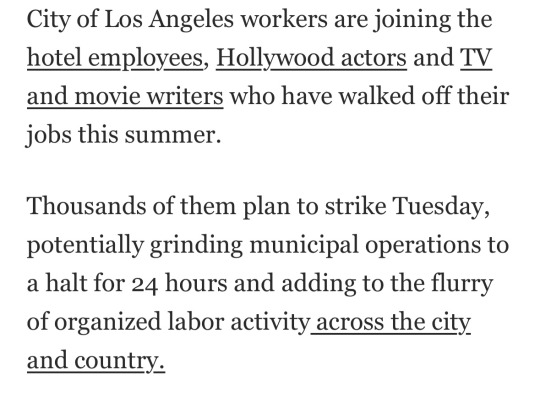
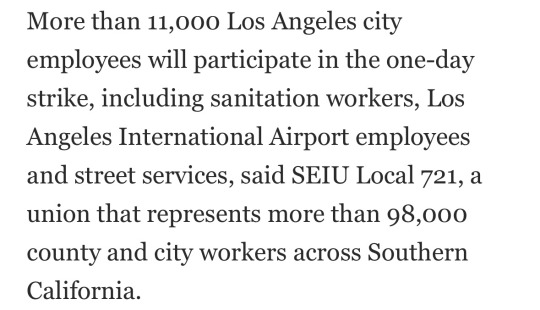
Source
Let’s go
#unions#unionize#labor#workers#workers rights#solidarity#capitalism#California#government#the left#progressive#current events#news
19K notes
·
View notes
Photo

#tweet#tweets#twitter#pixar#workers rights#workers vs capital#workers#labor vs capital#labor rights#labor#capitalism is a scam#toy story#toy story 2
34K notes
·
View notes
Photo

41K notes
·
View notes
Note
Hi- er, this is my first-ever writer's strike, how does one not cross a picket line in this context? I know how not to do it with things like Amazon and IRL strikes, but how does it apply to media/streaming?
Hi, this is a great question, because it allows me to write about the difference between honoring a picket line and a boycott. (This is reminding me of the labor history podcast project that's lain fallow in my drafts folder for some time now...) In its simplest formulation, the difference between a picket line and a boycott is that a picket line targets an employer at the point of production (which involves us as workers), whereas a boycott targets an employer at the point of consumption (which involves us as consumers).
So in the case of the WGA strike, this means that at any company that is being struck by the WGA - I've seen Netflix, Amazon, Apple, Disney, Warner Brothers Discovery, NBC, Paramount, and Sony mentioned, but there may be more (check the WGA website and social media for a comprehensive list) - you do not cross a picket line, whether physical or virtual. This means you do not take a meeting with them, even if its a pre-existing project, you do not take phone calls or texts or emails or Slacks from their executives, you do not pitch them on a spec script you've written, and most of all you do not answer any job application.
Because if this strike is like any strike since the dawn of time, you will see the employers put out ads for short-term contracts that will be very lucrative, generally above union scale - because what they're paying for in addition to your labor is you breaking the picket line and damaging the strike - to anyone willing to scab against their fellow workers. GIven that one of the main issues of the WGA are the proliferation of short-term "mini rooms" whereby employers are hiring teams of writers to work overtime for a very short period, to the point where they can only really do the basics (a series outline, some "broken stories," and some scripts) and then have the showrunner redo everything on their lonesome, while not paying writers long-term pay and benefits, I would imagine we're going to see a lot of scab contracts being offered for these mini rooms.
But for most of us, unless we're actively working as writers in Hollywood, most of that isn't going to be particularly relevant to our day-to-day working lives. If you're not a professional or aspiring Hollywood writer, the important thing to remember honoring the picket line doesn't mean the same thing as a boycott. WGA West hasn't called on anyone to stop going to the movies or watching tv/streaming or to cancel their streaming subscriptions or anything like that. If and when that happens, WGA will go to some lengths to publicize that ask - and you should absolutely honor it if you can - so there will be little in the way of ambiguity as to what's going on.
That being said, one of the things that has happened in the past in other strikes is that well-intentioned people get it into their heads to essentially declare wildcat (i.e, unofficial and unsanctioned) boycotts. This kind of stuff comes from a good place, someone wanting to do more to support the cause and wanting to avoid morally contaminating themselves by associating with a struck company, but it can have negative effects on the workers and their unions. Wildcat boycotts can harm workers by reducing back-end pay and benefits they get from shows if that stuff is tied to the show's performance, and wildcat boycotts can hurt unions by damaging negotiations with employers that may or may not be going on.
The important thing to remember with all of this is that the strike is about them, not us. Part of being a good ally is remembering to let the workers' voices be heard first and prioritizing being a good listener and following their lead, rather than prioritizing our feelings.
28K notes
·
View notes
Text

(Nov. 7)
@MorePerfectUS: Bangladesh is raising the minimum wage for garment workers by 56% after workers led mass protests. Weeks of strikes had shut down factories for brands like Gap, H&M, and Zara. Worker groups plan to keep protesting, saying the new $113/month wage falls far short of fair pay.
10K notes
·
View notes
Text
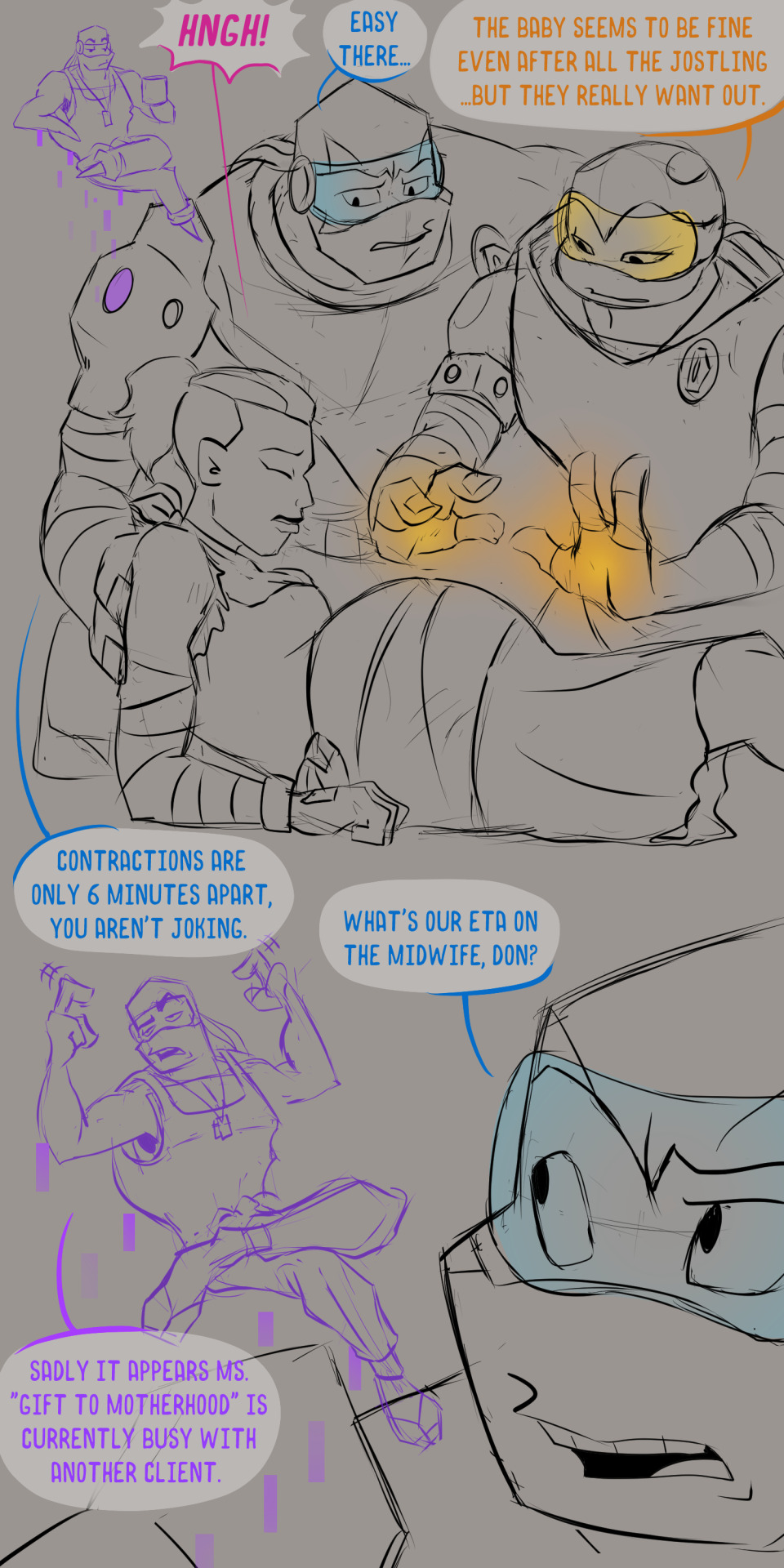
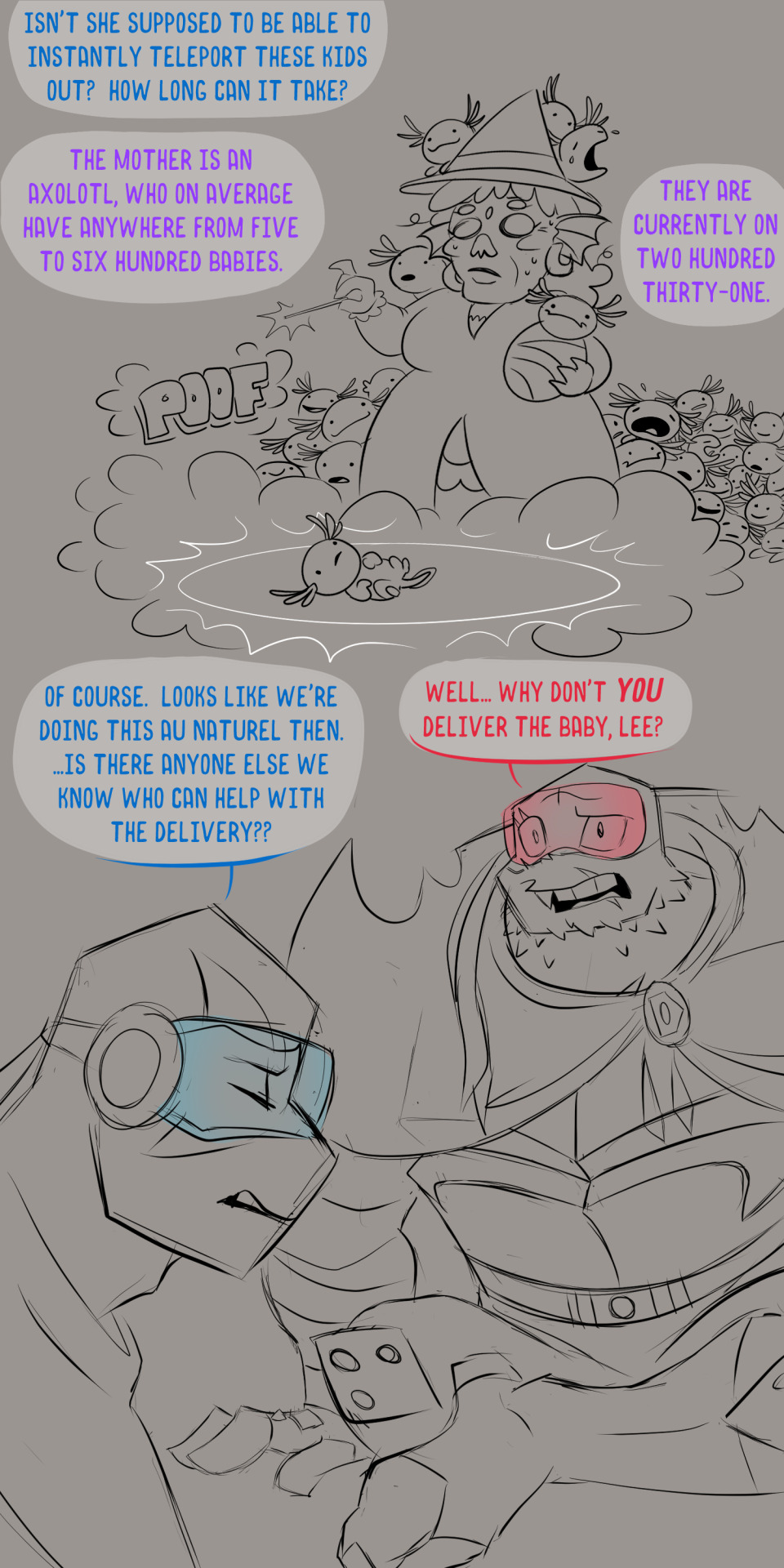
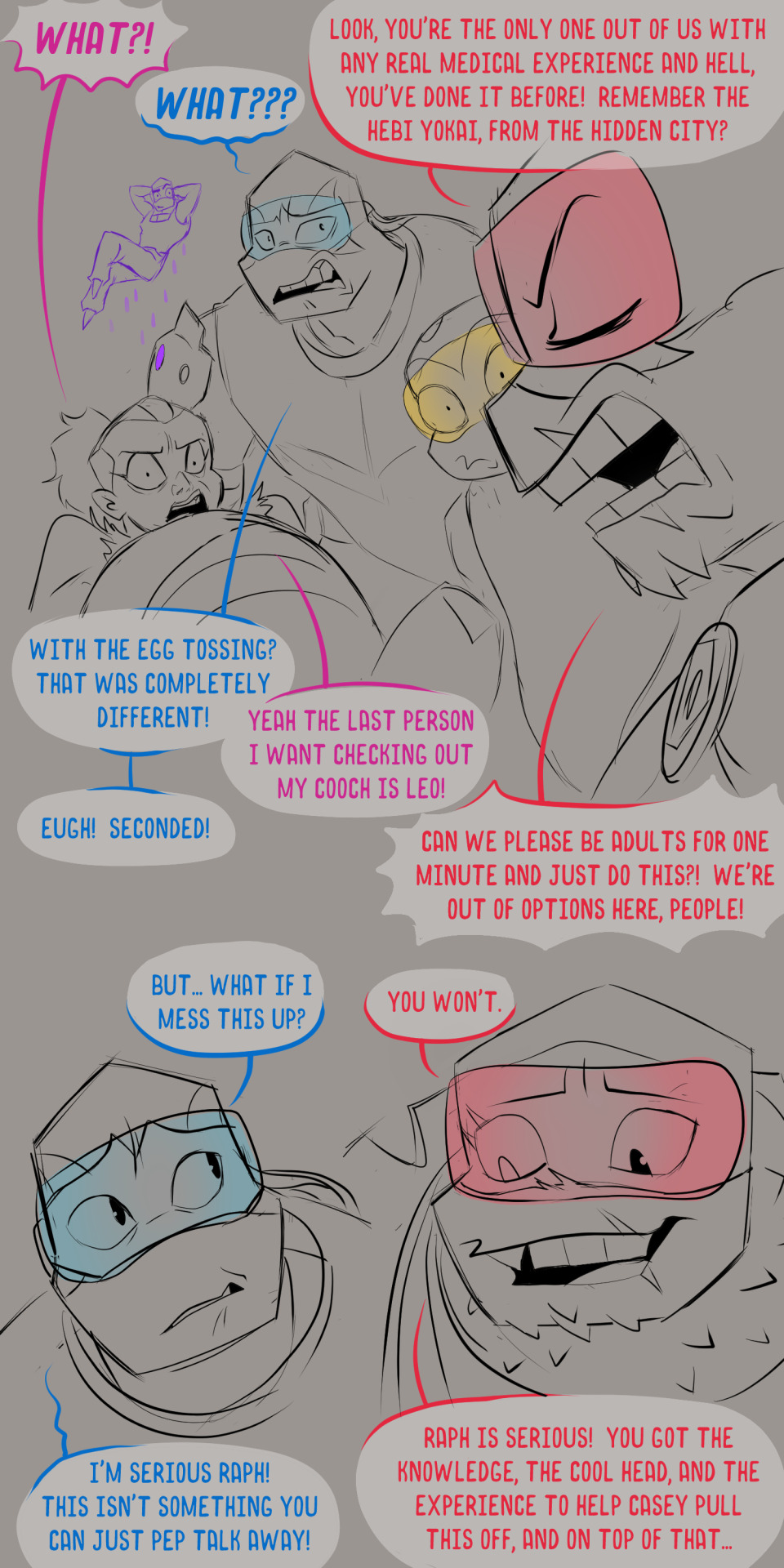
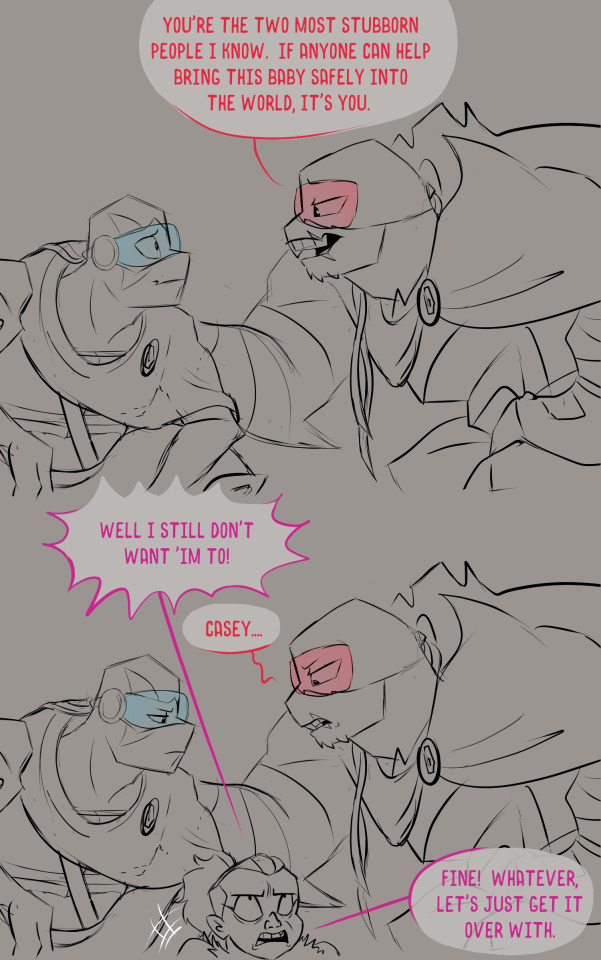
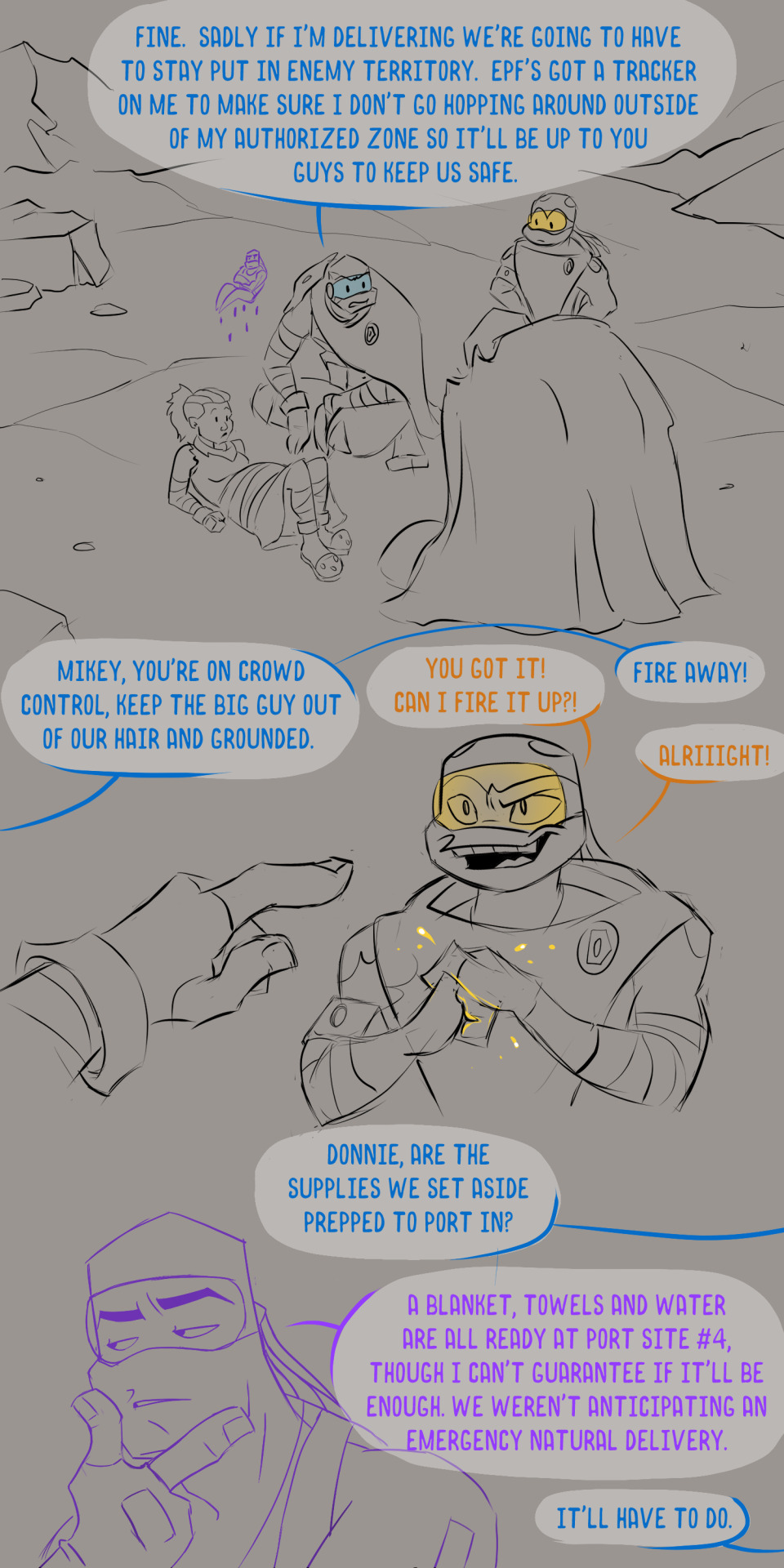
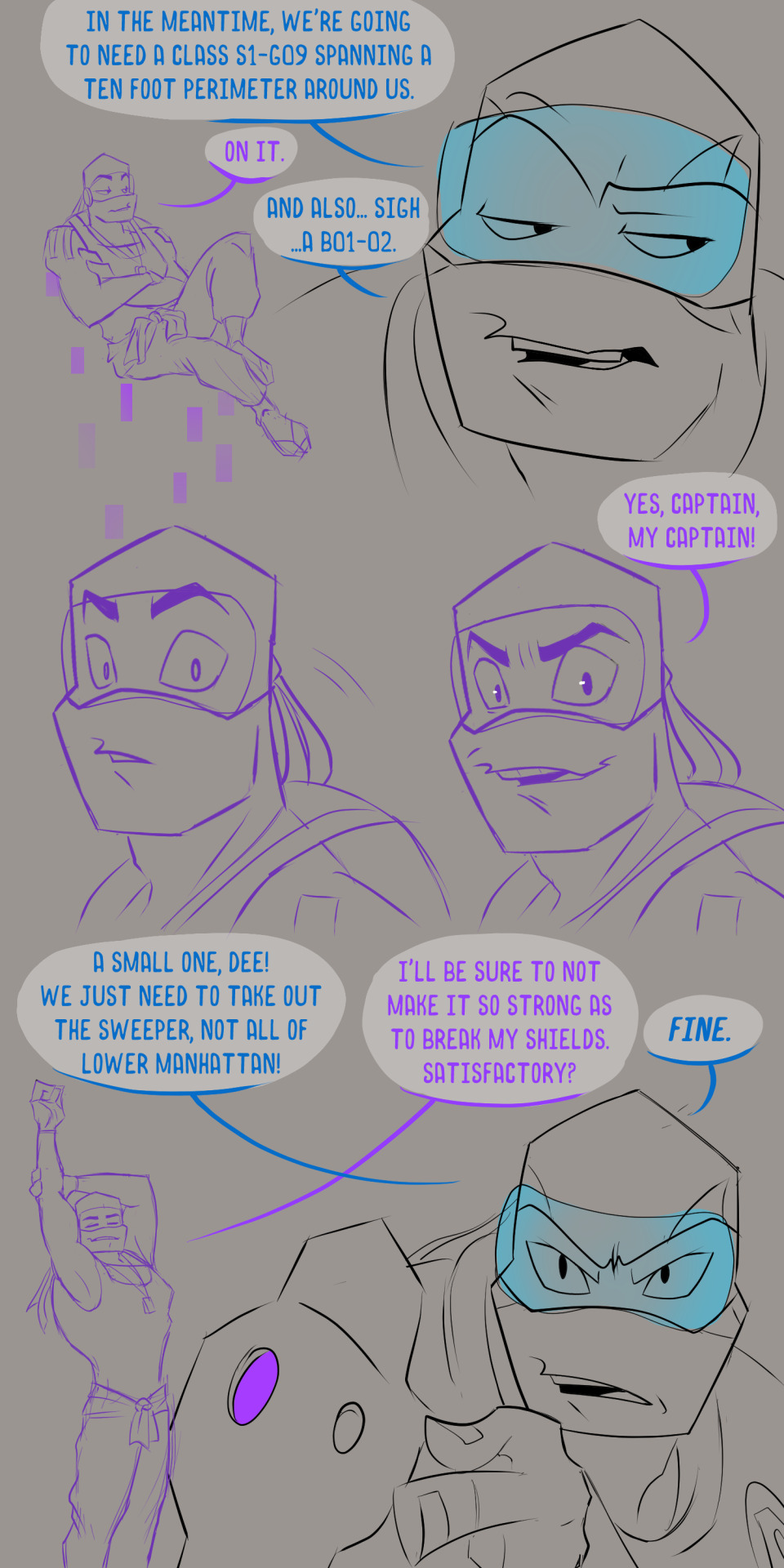

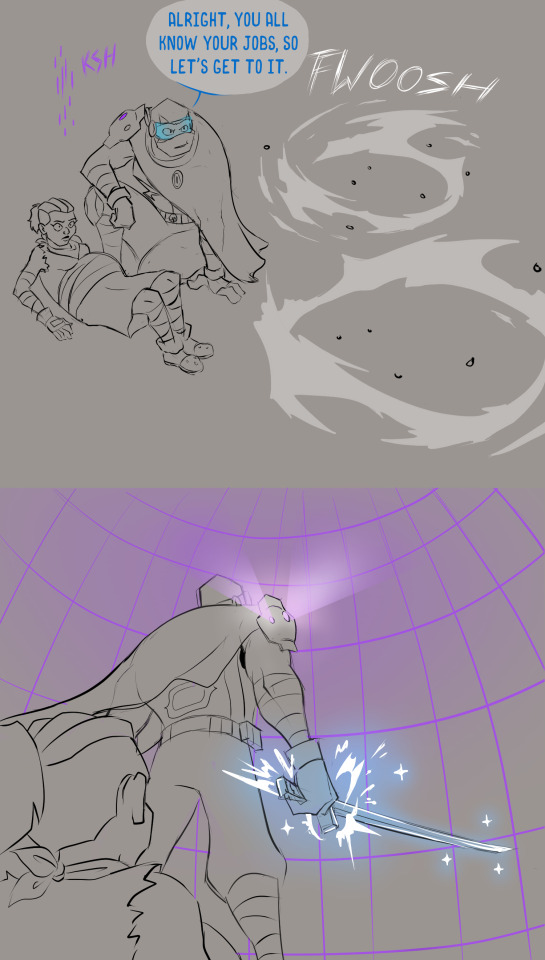
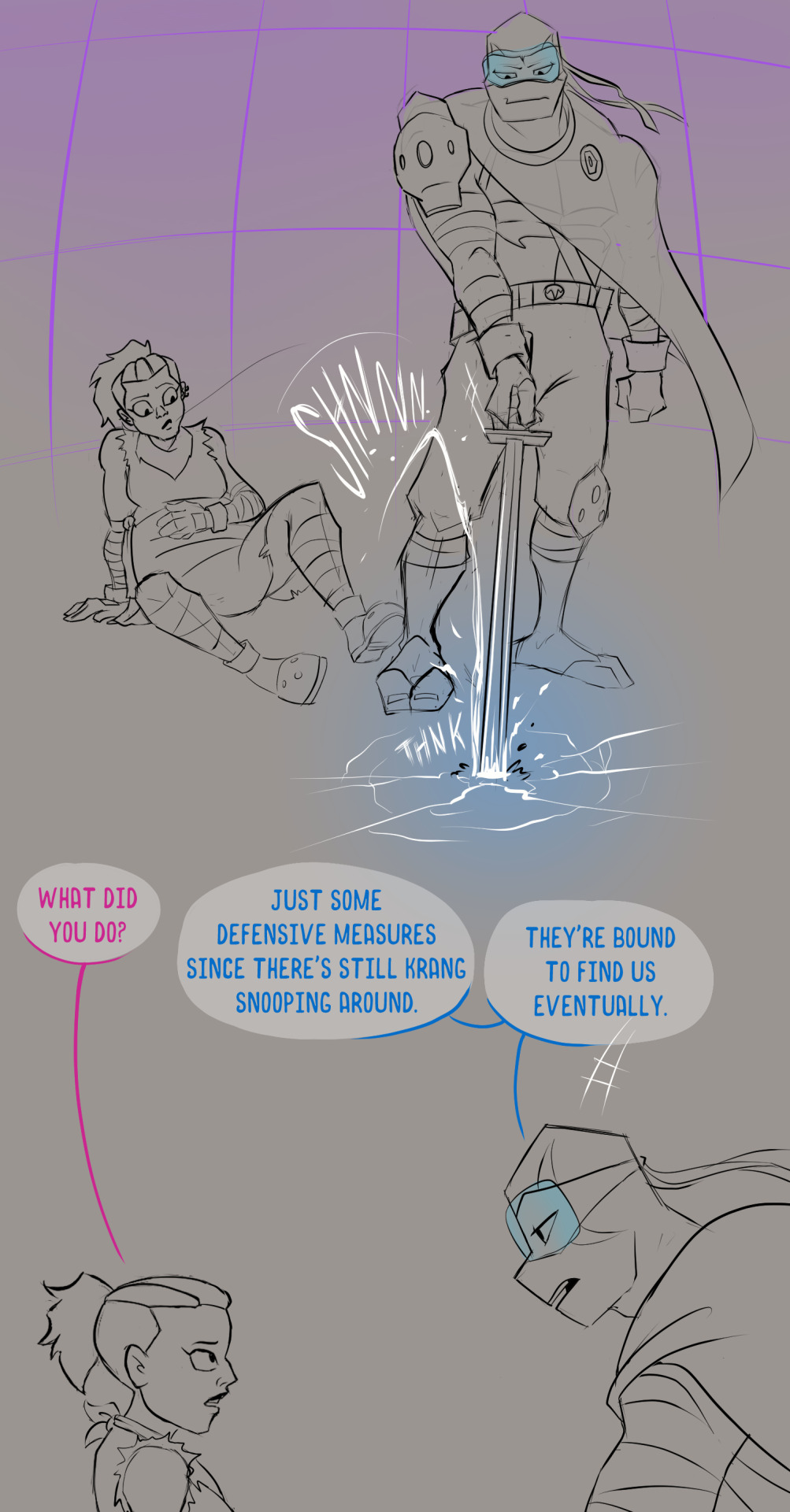
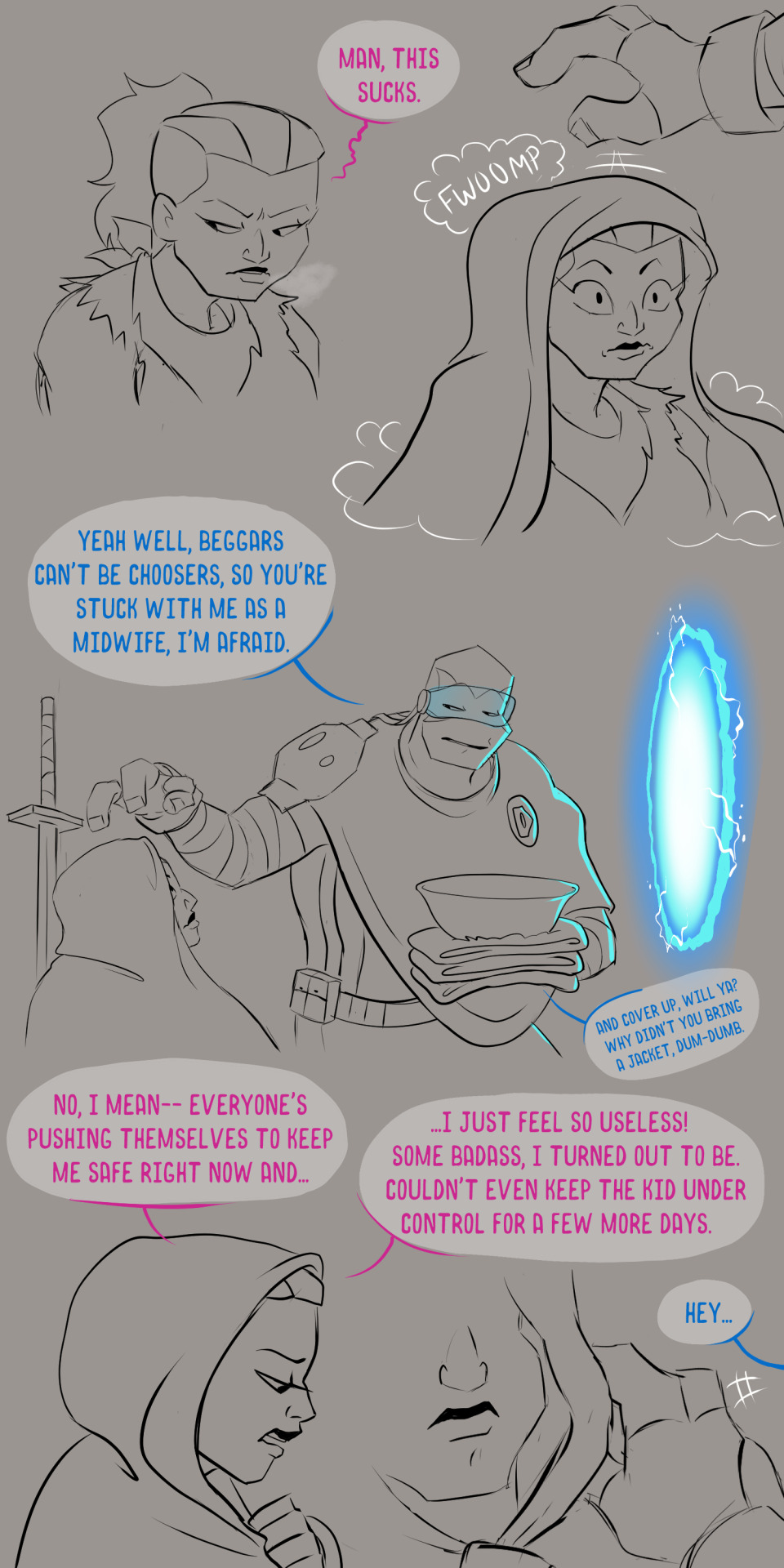
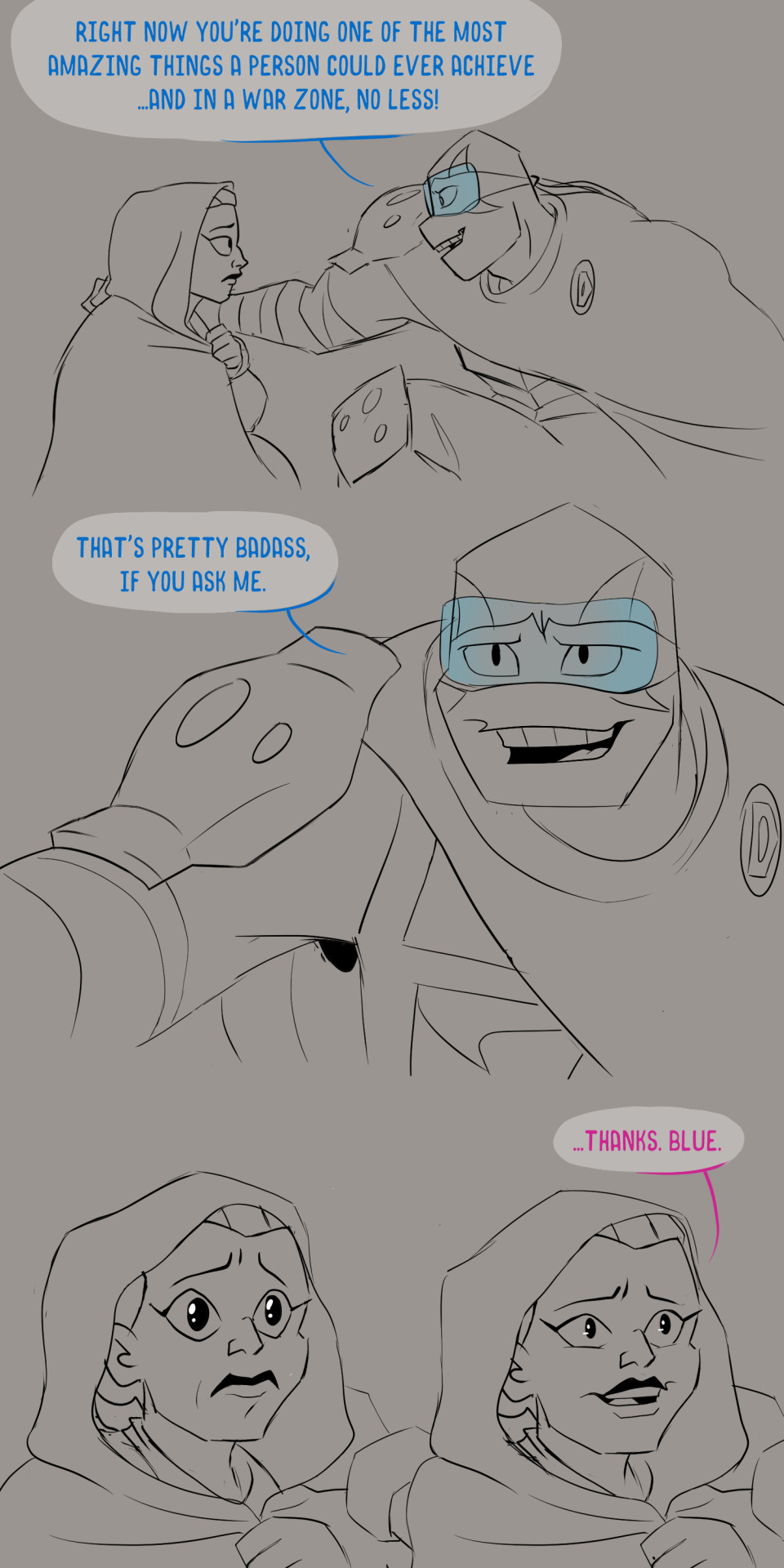
The eye of the hurricane. I like to think Cassandra sometimes called the brothers by the nicknames their dad used, given they were probably pretty close before his passing.
BEGINNING || PREVIOUS || NEXT (SOON)
MASTER POST
Man oh man, this one was way messier and off model than my last few updates but whatever, we got to keep this ball rolling! Life's been crazy so I've had to take some unwanted breaks in between updates. Thanks everyone for your patience as always!
One thing I wanted in this flashback was to really get a sense of how the brothers worked as an experienced team with Leo at the helm as a proper leader. It's something we never got to see much of in Rise and I felt it was important to include since half the team is already gone by the time of Replica. Team Dynamics Ted Talk under the cut!
We know from Casey Jr that Leo stressed the importance of listening to your team. A big part of that also means knowing how to communicate with them in general.
With Michelangelo, he keeps it short and succinct, trusting his brother to know what he's doing when in his element. This trust goes a long way with Mikey, having spent years of his youth as the baby striving for the respect he felt he deserved. Leo knows it's best to not bog Mikey down with details, allowing him to improvise as needed. This unspoken freedom has only grown over time as Mikey has dipped deeper into spiritual arts that, frankly, go completely over Leo's head.
The greatest sacrifice Leo has ever made was read Donnie's Big Book of Bad Guy Codes. While he doesn't remember ALL the numbers, he has memorized the ones that matter and it has helped tremendously in avoiding miscommunication with his genius brother. More importantly it silenced any of Donnie's usual belly-aching. As Leo's "twin"/"equal" the two still butt heads from time to time. Donnie respects his brother's authority (mostly) but will still push the boundaries of what he's allowed on a semi-regular basis. Give Donnie an inch and he will take the mile and then find a loop hole that allows him to go twenty miles more. This is partially due to him often being the one left behind at HQ, making the turtle just a TAD stir crazy. Leo does his best to keep him in line regardless.
Big brother Raph will forever and always be big brother to Leo. As such he holds a place of authority in Leo's heart and is someone he still regularly seeks counsel from in both the ways of leadership and more. Raph is always happy to support his younger brother and does a surprisingly good job (albeit after years of practice) of walking the line so as not to step on his brother's toes in the process. At least not since the secret of "the Key" blew up in their faces several years ago. They don't talk about that anymore. Leo is the leader now and he's done a great job in recent years as far as Raph is concerned. He trusts him to make the right call. The two have a close bond and regularly use mind meld to quickly communicate rather than speak ...this will be important to remember for the future.
Hope that overall feeling came through for this group!
#rottmnt replica#replica#rottmnt#save rottmnt#rise of the teenage mutant ninja turtles#kathaynesart#unpause rottmnt#pregnancy#labor pain#labor#birthing#tmnt#rise of the tmnt#rise leo#rise mikey#rise donnie#rise raph#profanity#is cooch profanity?#I don't know I just found it funny
4K notes
·
View notes
Text
Sam Delgado at Vox:
It’s been another big week for the UAW.
Over 5,000 auto workers at the Mercedes-Benz assembly plant in Vance, Alabama, have been holding their union election vote with the United Auto Workers (UAW); ballots will be counted when voting closes today.
It’s the UAW’s second election in their campaign to organize non-union auto workers, with a particular focus on the South — a notoriously difficult region for union drives. They won their first election with Volkswagen workers last month in Tennessee with 73 percent of workers voting to form a union.
What makes the UAW’s recent success compelling is that they’re finding big wins at a time when union membership rates in America are at an all-time low.
But each union drive is a battle: With our current labor laws, unionizing is not an easy process — particularly when workers are up against anti-union political figures and employers, as is the case at the Alabama Mercedes plant.
So if the UAW can win another union election in a region that’s struggled to realize worker power, it could mean more than just another notch in their belt. It could offer lessons on how to reinvigorate the American labor movement.
What’s at stake in Vance, Alabama?
Unionizing nearly anywhere in the US will require some sort of uphill battle, but this is especially true for the South. According to the US Bureau of Labor Statistics, most of the South had unionization rates below the national average in 2023. Alabama resides within one of those regions, at a union membership rate of 7.5 percent compared to a national rate of 10 percent.
This is the result of historical realities (see: slavery and racist Jim Crow laws) that have shaped today’s legislation: Alabama is one of 26 states that have enacted a “right-to-work” law, which allows workers represented by a union to not pay union fees, thus weakening the financial stability and resources of a union to bargain on behalf of their members.
Prominent political figures in Alabama have been vocal about their opposition to the UAW, too. Gov. Kay Ivey has called the UAW a “looming threat” and signed a bill that would economically disincentivize companies from voluntarily recognizing a union.
Workers say Mercedes hasn’t been welcoming to the union, either. In February, the CEO of Mercedes-Benz US International held a mandatory anti-union meeting (he’s changed roles since then). Back in March, the UAW filed charges with the National Labor Relations Board against Mercedes for “aggressive and illegal union-busting.” And according to a recent report from Bloomberg, the US government voiced concerns to Germany, home of Mercedes-Benz’s headquarters, about the alleged union-busting happening at the Alabama plant.
The combination of weak federal labor laws, a strong anti-union political presence, and a well-resourced employer can be a lethal combination for union drives and labor activity — and have been in Alabama. Recent examples include the narrow loss to unionize Amazon’s Bessemer warehouse, the nearly two-year long Warrior Met Coal strike that ended with no improved contract, and even past failed unionization drives at this Mercedes plant.
[...]
Where’s this momentum coming from — and where is it going?
The UAW is in a strong position after a series of wins. First they won their contract battle with Detroit’s Big Three automakers last year. Then they successfully unionized the Volkswagen plant in Chattanooga, Tennessee, in mid-April (the first time a non-union auto plant in the South was unionized in around 80 years). Later that month, they ratified a contract with Daimler Trucks after threatening to strike, securing a wage raise and annual cost-of-living increases among other benefits. Where are these wins coming from?
A big part of the momentum comes from Shawn Fain, the president of the UAW. He’s ambitious and a hard-nosed negotiator, isn’t afraid to break from the traditions of UAW’s past, and perhaps most importantly, is also the first leader of the UAW directly elected by members.
The UAW is leading a unionization drive at the Mercedes-Benz plant in Vance, Alabama. Hope it wins. #UAWVance #UAW #1u
#UAW#United Auto Workers#Mercedes Benz#Vance Alabama#Mercedes Benz Vance#Unions#Labor#Workers' Rights#Unionization#Kay Ivey#Alabama#Shawn Fain
18 notes
·
View notes
Text
Amazon's bestselling "bitter lemon" energy drink was bottled delivery driver piss
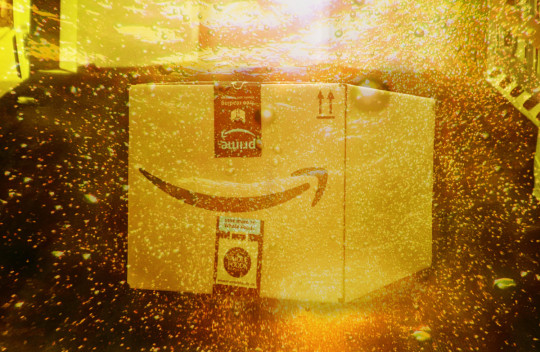
Today (Oct 20), I'm in Charleston, WV at Charleston's Taylor Books from 12h-14h.

For a brief time this year, the bestselling "bitter lemon drink" on Amazon was "Release Energy," which consisted of the harvested urine of Amazon delivery drivers, rebottled for sale by Catfish UK prankster Oobah Butler in a stunt for a new Channel 4 doc, "The Great Amazon Heist":
https://www.channel4.com/programmes/the-great-amazon-heist
Collecting driver piss is surprisingly easy. Amazon, you see, puts its drivers on a quota that makes it impossible for them to drive safely, park conscientiously, or, indeed, fulfill their basic human biological needs. Amazon has long waged war on its employees' kidneys, marking down warehouse workers for "time off task" when they visit the toilets.
As tales of drivers pissing – and shitting! – in their vans multiplied, Amazon took decisive action. The company enacted a strict zero tolerance policy for drivers returning to the depot with bottles of piss in their vans.
That's where Butler comes in: the roads leading to Amazon delivery depots are lined with bottles of piss thrown out of delivery vans by drivers who don't want to lose their jobs, which made harvesting the raw material for "Release Energy" a straightforward matter.
Butler was worried that he wouldn't be able to list his product on Amazon because he didn't have the requisite "food and drinks licensing" certificates, so he listed his drink in Amazon's refillable pump dispenser category. But Amazon's systems detected the mismatch and automatically shifted the product into the drinks section.
Butler enlisted some confederates to place orders for his drink, and it quickly rocketed to the top of Amazon's listings for the category, which led to Amazon's recommendation engine pushing the item on people who weren't in on the gag. When these orders came in, Butler pulled the plug, but not before an Amazon rep telephoned him to pitch him turning packaging, shipping and fulfillment over to Amazon:
https://www.wired.com/story/amazon-let-its-drivers-urine-be-sold-as-an-energy-drink/
The Release Energy prank was just one stunt Butler pulled for his doc; he also went undercover at an Amazon warehouse, during a period when Amazon hired an extra 1,000 workers for its warehouses in Coventry, UK, in a successful bid to dilute pro-union sentiment in his workforce in advance of a key union vote:
https://jacobin.com/2023/10/the-great-amazon-heist-oobah-butler-review
Butler's stint as an Amazon warehouse worker only lasted a couple of days, ending when Amazon recognized him and fired him.
The contrast between Amazon's ability to detect an undercover reporter and its inability to spot bottles of piss being marketed as bitter lemon energy drink says it all, really. Corporations like Amazon hire vast armies of "threat intelligence" creeps who LARP at being CIA superspies, subjecting employees and activists to intense and often illegal surveillance.
But while Amazon's defensive might is laser-focused on the threat of labor organizers and documentarians, the company can't figure out that one of its bestselling products is bottles of its tormented drivers' own urine.
In the USA, the FTC is suing Amazon for its monopolistic tactics, arguing that the company has found ways to raise prices and reduce quality by trapping manufacturers and sellers with its logistics operation, taking $0.45-$0.51 out of every dollar they earn and forcing them to raise prices at all retailers:
https://pluralistic.net/2023/04/25/greedflation/#commissar-bezos
The Release Energy stunt shows where Amazon's priorities are. Not only did Release Energy get listed on Amazon without any quality checks, the company actually nudged it into a category where it was more likely to be consumed by a person. The only notice the company took of Release Energy was in its logistics and manufacturing department – the part of the business that extracts the monopoly rents at issue in the FTC case – which tracked Butler down in order to sell him these services.
The drivers whose piss Butler collected don't work directly for Amazon, they work for a Delivery Service Partner. These DSPs are victims of a pyramid scheme that Amazon set up. DSP operators lease vans and pay to have them skinned in Amazon livery and studded with Amazon sensors. They take out long-term leases on depots, and hire drivers who dress in Amazon uniforms. Their drivers are minutely monitored by Amazon, down to the movements of their eyeballs.
But none of this is "Amazon" – it's all run by an "entrepreneur," whom Amazon can cut loose without notice, leaving them with unfairly terminated employees, outstanding workers' comp claims, a fleet of Amazon-skinned vehicles and unbreakable facilities leases:
https://pluralistic.net/2022/04/17/revenge-of-the-chickenized-reverse-centaurs/
Speaking to Wired, Amazon denied that it forces its drivers to piss in bottles, but Butler clearly catches a DSP dispatcher telling drivers "If you pee in a bottle and leave it [in the vehicle], you will get a point for that" – that is, the part you get punished for isn't the peeing, it's the leaving.
Amazon's defense against the FTC is that it spares no effort to keep its marketplace safe. As Amazon spokesperson James Drummond says, they use "industry-leading tools to prevent genuinely unsafe products being listed." But the only industry-leading tools in evidence are tools to bust unions and screw suppliers.
In her landmark Yale Law Review paper, "Amazon's Antitrust Paradox," FTC Chair Lina Khan makes a brilliant argument that Amazon's alleged benefits to "consumers" are temporary at best, illusory at worst:
https://www.yalelawjournal.org/note/amazons-antitrust-paradox
In Butler's documentary, Khan's hypothesis is thoroughly validated: here's a company extracting hundreds of billions from merchants who raise prices to compensate, and those monopoly rents are "invested" in union-busting and countermeasures against investigative journalists, while the tools to keep you from accidentally getting a bottle of piss in the mail are laughably primitive.
Truly, Amazon is the apex predator of the platform era:
https://pluralistic.net/ApexPredator

If you'd like an essay-formatted version of this post to read or share, here's a link to it on pluralistic.net, my surveillance-free, ad-free, tracker-free blog:
https://pluralistic.net/2023/10/20/release-energy/#the-bitterest-lemon

My next novel is The Lost Cause, a hopeful novel of the climate emergency. Amazon won't sell the audiobook, so I made my own and I'm pre-selling it on Kickstarter!
#pluralistic#release energy#channel 4#amazon#corporate intelligence#labor#unions#amazon labor union#the great Amazon heist#catfish uk#oobah butler#delivery service partner
7K notes
·
View notes
Text
Federal regulators on Tuesday [April 23, 2024] enacted a nationwide ban on new noncompete agreements, which keep millions of Americans — from minimum-wage earners to CEOs — from switching jobs within their industries.
The Federal Trade Commission on Tuesday afternoon voted 3-to-2 to approve the new rule, which will ban noncompetes for all workers when the regulations take effect in 120 days [So, the ban starts in early September, 2024!]. For senior executives, existing noncompetes can remain in force. For all other employees, existing noncompetes are not enforceable.
[That's right: if you're currently under a noncompete agreement, it's completely invalid as of September 2024! You're free!!]
The antitrust and consumer protection agency heard from thousands of people who said they had been harmed by noncompetes, illustrating how the agreements are "robbing people of their economic liberty," FTC Chair Lina Khan said.
The FTC commissioners voted along party lines, with its two Republicans arguing the agency lacked the jurisdiction to enact the rule and that such moves should be made in Congress...
Why it matters
The new rule could impact tens of millions of workers, said Heidi Shierholz, a labor economist and president of the Economic Policy Institute, a left-leaning think tank.
"For nonunion workers, the only leverage they have is their ability to quit their job," Shierholz told CBS MoneyWatch. "Noncompetes don't just stop you from taking a job — they stop you from starting your own business."
Since proposing the new rule, the FTC has received more than 26,000 public comments on the regulations. The final rule adopted "would generally prevent most employers from using noncompete clauses," the FTC said in a statement.
The agency's action comes more than two years after President Biden directed the agency to "curtail the unfair use" of noncompetes, under which employees effectively sign away future work opportunities in their industry as a condition of keeping their current job. The president's executive order urged the FTC to target such labor restrictions and others that improperly constrain employees from seeking work.
"The freedom to change jobs is core to economic liberty and to a competitive, thriving economy," Khan said in a statement making the case for axing noncompetes. "Noncompetes block workers from freely switching jobs, depriving them of higher wages and better working conditions, and depriving businesses of a talent pool that they need to build and expand."
Real-life consequences
In laying out its rationale for banishing noncompetes from the labor landscape, the FTC offered real-life examples of how the agreements can hurt workers.
In one case, a single father earned about $11 an hour as a security guard for a Florida firm, but resigned a few weeks after taking the job when his child care fell through. Months later, he took a job as a security guard at a bank, making nearly $15 an hour. But the bank terminated his employment after receiving a letter from the man's prior employer stating he had signed a two-year noncompete.
In another example, a factory manager at a textile company saw his paycheck dry up after the 2008 financial crisis. A rival textile company offered him a better job and a big raise, but his noncompete blocked him from taking it, according to the FTC. A subsequent legal battle took three years, wiping out his savings.
-via CBS Moneywatch, April 24, 2024
--
Note:
A lot of people think that noncompete agreements are only a white-collar issue, but they absolutely affect blue-collar workers too, as you can see from the security guard anecdote.
In fact, one in six food and service workers are bound by noncompete agreements. That's right - one in six food workers can't leave Burger King to work for Wendy's [hypothetical example], in the name of "trade secrets." (x, x, x)
Noncompete agreements also restrict workers in industries from tech and video games to neighborhood yoga studios. "The White House estimates that tens of millions of workers are subject to noncompete agreements, even in states like California where they're banned." (x, x, x)
The FTC estimates that the ban will lead to "the creation of 8,500 new businesses annually, an average annual pay increase of $524 for workers, lower health care costs, and as many as 29,000 more patents each year for the next decade." (x)
Clearer explanation of noncompete agreements below the cut.
Noncompete agreements can restrict workers from leaving for a better job or starting their own business.
Noncompetes often effectively coerce workers into staying in jobs they want to leave, and even force them to leave a profession or relocate.
Noncompetes can prevent workers from accepting higher-paying jobs, and even curtail the pay of workers not subject to them directly.
Of the more than 26,000 comments received by the FTC, more than 25,000 supported banning noncompetes.
#seriously cannot emphasize enough that this is going to be a huge deal for so so many people#it could seriously drag up wages in food and service industries in particular#especially in the long run#and also massively reshape tech and video game industries#do you have any idea how many game devs are legally not allowed to start their own studios? probably most of them#and that's about to change for the better!!#ftc#noncompete#united states#us politics#business#business news#biden administration#voting matters#democrats#federal trade commission#video game industry#game devs#fast food#fast food workers#labor#labor rights#workers rights#blue collar#service workers#good news#hope
2K notes
·
View notes

